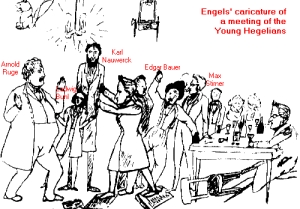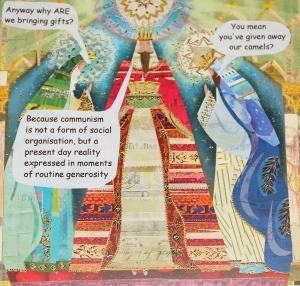
Contradiction: the crucible of historical materialism
Roland Boer continues his series of article on Marxism and religion, with an examination of the relationship of Marx and Engels to the Theological Young Hegelians: Strauss, Feuerbach, Bauer and Stirner.
In order to develop their own system of thought, Marx and Engels had to distinguish themselves from the overwhelming theological frame in which German thought operated in the 1830s and 1840s. This framework was embodied above all in the work of the Young Hegelians, especially Ludwig Feuerbach, Bruno Bauer and Max Stirner. Let me say a little more about these crucial engagements.
Ludwig Feuerbach’s Projections
Alongside David Friedrich Strauss’s controversial Life of Jesus (1839), Feuerbach’s The Essence of Christianity from 1841 was one of the most significant texts of the time. Marx saw the idea that religion and the gods were projections of human beings as a huge breakthrough. He used and extended what may be called the ‘Feuerbachian inversion’ at a number of points in his own work. Feuerbach’s idea is an inversion since it argues that previous thought about religion began at the wrong point, namely in the middle. God was not a pre-existing being who determined human existence; rather, human beings determine God’s existence, whom they then assume to be all-powerful over human beings.
Marx took up this argument and claimed that it marked the end of the criticism of religion: ‘For Germany the criticism of religion is in the main complete, and criticism of religion is the premise of all criticism’. He went on to suggest that the first great phase of criticism – the criticism of religion – began with Luther and ended with Feuerbach. The next revolutionary phase began after Feuerbach and Marx saw himself as part of this new phase.
For Marx, Feuerbach was the last word on religion. Statements such as the following are pure Feuerbach:
Religion is the general theory of this world, its encyclopaedic compendium, its logic in popular form, its spiritual point d’honneur, its enthusiasm, its moral sanction, its solemn complement, and its universal basis of consolation and justification. It is the fantastic realization of the human essence since the human essence has not acquired any true reality.
However, Marx also wanted to go beyond Feuerbach on two counts. First, since human beings project religion from within themselves, the place to begin analysis is not in the heavens, but here on earth with flesh-and-blood people. Second, the fact that people do make such projections was a signal that something was wrong here on earth. If people placed their hopes and dreams elsewhere, then that meant they could not be realized here and now. So the presence of religion becomes a sign of alienation, of economic and social oppression. That needs to be fixed. We find this theme very strongly in the famous Theses on Feuerbach, especially the fourth and eleventh theses:
Feuerbach starts out from the fact of religious self-estrangement, of the duplication of the world into a religious world and a secular one. His work consists in resolving the religious world into its secular basis. But that the secular basis lifts off from itself and establishes itself as an independent realm in the clouds can only be explained by the inner strife and intrinsic contradictoriness of this secular basis. The latter must, therefore, itself be both understood in its contradiction and revolutionised in practice. Thus, for instance, once the earthly family is discovered to be the secret of the holy family, the former must then itself be destroyed in theory and in practice.
The philosophers have only interpreted the world in various ways; the point is to change it.
Marx would go on to use the ‘Feuerbachian inversion’ in a number of ways, not least to argue that Hegel’s position on the state was exactly the same as theology: it began with abstracted ideas such as state, sovereignty, constitution and tried to make human beings fit. Much later on, in 1886, Engels filled this picture out in his lucid prose and showed why Feuerbach was so important for the development of historical materialism.
Bruno Bauer’s A-Theology
Given Feuerbach’s importance, it is not for nothing that the first section of The German Ideology should be devoted to his work. But there is also a section given over to Bruno Bauer. After the joint work of The German Ideology, Marx would come back to Bauer in a number of writings, initially to defend him but then later to attack him mercilessly. Why? The basic reason was that Bauer had achieved a radical republican and democratic position through his biblical criticism and theology. Marx in particular was thoroughly opposed to such a possibility: theology dealt with heaven and was not concerned with earth – that was the task of the new historical materialism.
For Marx, Bauer was far too much under the influence of Hegel’s idealist method and in many respects Marx’s distancing from Bauer was an effort to come to terms with Hegel. So we find the repeated and often heavily satirical criticism (especially in the joint work with Engels, The Holy Family) that ‘Saint Bruno’ Bauer left matters in the realm of theology and thereby stunted his critical work. Marx was also excising the influence of someone who had been a close friend, first as joint members of the Young Hegelian Doktorklub from 1837, later as a teacher of the book of Isaiah at the University of Berlin in 1839 and as one who might have gained Marx a position.
The problem was that Bauer was dismissed from Berlin in 1839 for his radical theological and political positions. He argued that the church was ossified and dogmatic, for it claimed universal status for a particular person and group. In the same way that we find a struggle in the Bible between free self-consciousness and religious dogmatism, so also in Bauer’s own time the religious dogmatism of the church needed to be overthrown. In its place Bauer argued for atheism, a democratic Jesus for all and republicanism.
Max Stirner’s World History
So we find Marx and Engels at the point where Feuerbach’s inversion has enabled them to step beyond the criticism of religion and focus on the criticism of the earthly conditions of human struggle, and Bauer’s radical theology had to be negated since religion cannot provide – so they argued – a radical critique. The engagement with Max Stirner was different. Most people do not bother with the endless pages of The German Ideology given over to a detailed refutation of Stirner’s The Ego and His Own, preferring to stop after the early description of the new historical materialist method.
However, the Stirner section is crucial for the following reason: Marx and Engels developed the first coherent statement of historical materialism in response to Stirner’s own theory of world history. The way they wrote the manuscript (which was never published in their lifetimes) is important: as they wrote sections on Stirner they found that increasingly coherent statements of an alternative position began to emerge in their own thought. Some of these statements remained in the Stirner section, while others were moved to the beginning of the manuscript and placed in the Feuerbach section.
As these responses to Stirner became longer and more elaborate, we find the following: in contrast to Stirner’s radical focus on the individual, Marx and Engels developed a collective focus. Instead of Stirner’s valuation of spiritual religion, they sought an approach that was very much of this world. Above all, Stirner wanted to provide a schema of world history that was pitched against Hegel. The reason why Marx and Engels devoted so much attention to him is that they too want a schema of world history that overturns Hegel.
The catch is that the very effort at producing a theory of world history was still very much engaged with religion. One only has to look at the structure of Marx and Engel’s criticism – which moves through the major books of the Bible, quotes the Bible ad nauseam, and criticizes Stirner’s prophetic role and theological dabbling – to see that what is at stake is religion. In the same way that the final edited form of the Bible moves from creation to the end of history and the new Jerusalem, so also does Hegel offer a theory of world history in terms of the unfolding of spirit, and so also does Stirner do so in terms of the ego. But what about Marx and Engels?



